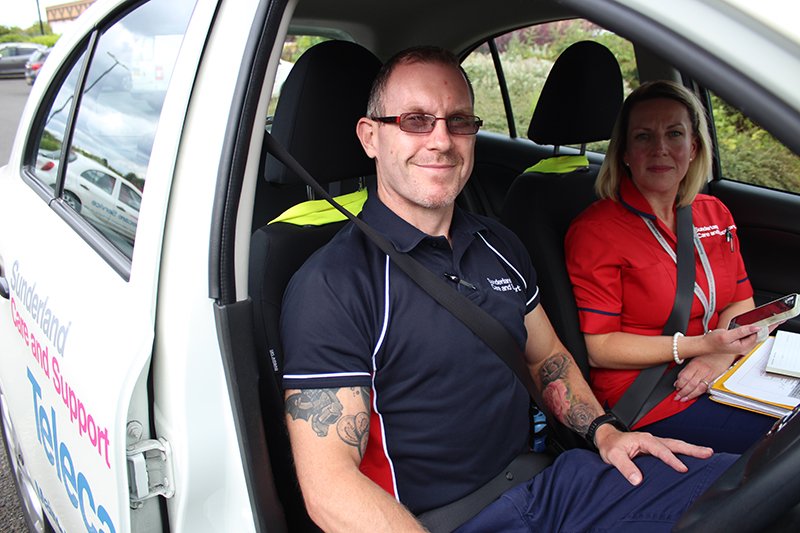Across Sunderland, hundreds of people with long term conditions live alone or are supported by family members or carers. To remain independent in their own home they sometimes need specialised equipment just in case they have unexpected illness, a fall or accident.
Sunderland Care and Support’s Telecare team is in place to support these people by providing highly advanced social care technology, including an urgent response, should they need it.
Technology available includes pendant alarms, property exit sensors; medication reminders to falls alerts; and even incontinence notifications. The Telecare team, based in Leechmere, can supply this equipment or can be dispatched quickly to offer prioritised care when something goes awry at home.
Now, as part of an urgent care team – Recovery at Home – that delivers short-term, often intensive, home-based care to support Sunderland’s vulnerable if they become ill or injured and need more support, Telecare can help put in place devices that ensure people can quickly call in support during times of crisis.
Donna Bennett, who is a support coordinator in the Telecare team, said: “The service is highly responsive, and as part of Recovery at Home, we are able to work closely with colleagues to ensure that in the short-term, as people are recovering from bouts of illness or even injuries that are exacerbating their other long terms conditions, the right help can be offered to make it easy for them to call for help.
“Having been part of the team for more than 14 years I have seen such a change thanks to Recovery at Home. The integration of teams means that we can quickly speak to colleagues in other departments and arrange for further support to support the customer quickly and efficiently.
“Just this week, I had visited a gentleman who needed support with his mobility urgently. I popped in to see the Occupational Therapy team, and a colleague in that team arranged an appointment to see him immediately. Previously, that just wouldn’t have been possible.”
Recovery at Home is part of a wider NHS England-funded programme, known as All Together Better, which brings together health and social care teams, alongside local support organisations like Age UK Sunderland and Sunderland Carers’ Centre, to provide joined up care to some of the frailest people in the city. Recovery at Home sees teams of professionals come together from their Leechmere hub, to respond to urgent calls for help.
Donna, who manages a team of staff who respond to alarms raised for support in the community, offers advice to her team, who are often faced with making quick decisions about what support is required when they get to the home of the person who has triggered the alert.
Mark Walker is one member of Donna’s team. He explained how he can be faced with some really challenging call outs – with every day bringing something different.
“Working in Telecare is something totally different. From one day to the next, you just do not know what your job will entail. It’s so varied, but I think that’s what makes it a great role.
“We often get to people’s homes, and find they have suffered a fall or are feeling unwell. It is about recognising how urgently that person might need help, and calling in the right team to offer support. “Recovery at Home is one of the services we will call upon, if someone is unwell, but we believe they could remain at home with the right help quickly put in place we will call the Single Point of Contact at Leechmere and we can quickly get advice from a Nurse, who will then advise or dispatch the appropriate care. It works well and the support we have at our disposal means we don’t need to call out paramedics on every occasion.”
Telecare operates across Sunderland, offering support to those who need it. There is also an overnight service who deliver planned care visits out of hours, to check people are safe and well.
“Some days, I can drive over 100 miles, travelling between appointments,” explains Mark. “And other days, I might just travel 30 miles. No two days are ever the same.” “The whole service is about providing joined up, person-centred care to people who need it. It’s not only something that provides peace of mind for the person, it also means people benefit from more rapid, appropriate support to keep them well and out of hospital.”
